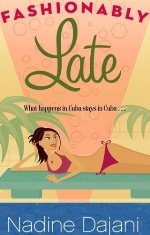It’s still a dirty word, like most things female-centric, still pejorative, still snubbed and looked down upon, and judged as one big homogenous blob in spite of the massive range of subjects, themes, situations, characters and moods it covers.
Here’s the hilarious Maureen Johnson’s recent take on the issue-that-won’t-die, which is one of the best, funniest treatments of the topic I’ve ever seen.
I’m not about to add my own voice to the circus as I’m sure I must have done it at some point in the past, and honestly, I don’t care what people call my books as long as they read them and (hopefully) enjoy them.
But the reason I’m bringing this whole thing up again, is because of a book I just finished reading that would certainly fall under the “chick lit” category, and therefore will never be eligible for any kind of literary prize or recognition, despite it being a truly impressively written novel. But because the heroine can probably be described as “plucky”, and certainly funny, plus she does describe her outfits every once in a while (not gratuitously, but as a seamless addition to plot and character), I doubt this book will ever be reviewed as seriously as, say, White Oleander was a few years back (another excellent book, for different reasons) or Wally Lamb’s She’s Come Undone (an awful, depressing look at an obese, sexually-preyed upon teenager on the cusp of entering college).
The book I just finished is Anyone Out There? by Marian Keyes, and based on the cover copy, I would never have picked up a book like this if it weren’t written by the never preachy, always hilarious Ms. Keyes.
Because this book, you see, is about death. More precisely, about the death of the love of one’s life. And I can handle a lot of depressing topics, but this is one I tend to steer clear of.
The genius of Anyone Out There? is in just how deep Keyes takes the reader into the main character, Anna’s, head. So deep, that even though you know her husband died (the rational side of your brain deduced it somewhere in the opening chapter), your emotional side is held completely hostage by Anna’s deep denial. When she finally utters the word ‘dead’ out loud, about a quarter into the book, you gasp. Because you didn’t want to hear it anymore that she did. You, the reader, were just as much in denial.
Also, as it goes with most literary fiction, not a whole lot happens in terms of plot, and yet, unlike most so-called literary fiction, you can’t put the damn book down. It makes you want to believe in the impossible, and yet when you get to the end, you realize that things could not have ended any other way.
Marian’s first novel, Watermelon, and her latest is genius. Now I just wish all those chick-lit bashers would take note that you don’t have to have an unsympathetic cast of characters, a thin an uninspiring plot, unusual situations, and an almost sterile distance from your subject matter to be qualified as a serious writer. Some writers actually manage to be hugely entertaining, highly relatable, and literary at the same time.
Subscribe to:
Post Comments (Atom)




No comments:
Post a Comment